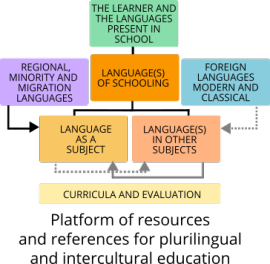Plurilingual and intercultural education: Definition and Founding Principles
Definition
Access to education and success at school depends heavily on language competences. Some pupils may be disadvantaged as soon as they start school because their competences do not match the school's expectations: children from disadvantaged backgrounds, children from migrant families, or children whose first language is a regional language. But all, whatever their language repertoire, must learn to communicate in school. A command of the language(s) of schooling is vital to success at school and social advancement.
One major challenge for education systems is to give learners, during their school education, language and intercultural competences which will enable them to operate effectively as citizens, acquire knowledge and develop open attitudes to otherness: this vision of the teaching of languages and cultures is referred to as plurilingual and intercultural education.
Plurilingual and intercultural education covers :
- the languages taught in the school
- the languages recognised by the school but not taught
- the languages and cultures which are present in school but neither recognised nor taught.
Its aims are to:
- implement a holistic approach to the teaching of the different subjects, i.e. identify and organise the transversal links and points of convergence among them, because language competence is a single entity, even if it has been divided into different school subjects;
- define the teaching goals and forms of competence to be achieved explicitly and coherently in order to ensure educational success and, in particular, that learning is assessed fairly and transparently.
Founding principles
Plurilingual and intercultural education is guided by the following founding principles:
- recognition of linguistic and cultural diversity as guaranteed by Council of Europe conventions;
- everyone's right to use their language varieties as a medium of communication, a vehicle for learning and a means of expressing their affiliations;
- every learner's right to gain experience and achieve a command of languages (language of schooling, first language, foreign language etc) and the related cultural dimensions according to their personal needs and expectations, be they cognitive, social, aesthetic or affective, so as to be able to develop the necessary competences in other languages by themselves after leaving school;
- the centrality of human dialogue, which depends essentially on languages. The experience of otherness through languages and the cultures they carry is the precondition (necessary but not sufficient) for intercultural understanding and mutual acceptance.



